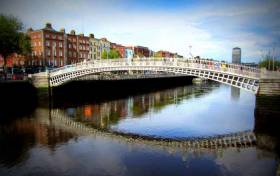Displaying items by tag: Tim & Mortimer McCarthy
There is always something interesting to be reported upon and discussed about the maritime sphere, I believe and so I always want to broadcast interesting stories on This Island Nation.
This week one underlines the importance of maintaining knowledge of our maritime history and passing it onto future generations.
That point was made to me on the quayside at Kinsale on the South Cork coastline where the town’s historical society laid wreaths at a memorial to two brothers, Tim and Mortimer McCarthy from a fishing family in the area, who had both won Polar medals for their service with the world’s renowned Polar explorers - Mortimer with Captain Scott on the Terra Nova Expedition in 1910.
A mountain in Antarctica is named after Mortimer McCarthy. His brother, Tim, was with Shackleton and Tom Crean on the legendary rescue voyage for the Endurance crew from Elephant Island in the James Caird lifeboat. But Tim is not as well-known as Tom Crean. The remembrance ceremony was held a hundred years to the day since Tim McCarthy, was killed while serving aboard the tanker SS Naragansett when it was torpedoed and sunk by the German submarine U44 off the South Coast of Ireland during World War One.
“The memory of these men is part of the history of this maritime town and must be preserved,” said Terry Connolly. “It is important that we remember and that we pass on what we remember to the younger generation so that they can know their history.”
He is correct about passing on our history to the next generation. He also referred to the “connection of the coincidence of history between Polar explorers and Irish revolutionaries” which you can hear about on the programme.
Underlining the ‘Family of the Sea’ concept which I focus in my programme, George Wheeler, whose grandfather was one of the 46 crew that died with Tim McCarthy aboard the Naragansett, travelled from Britain to lay a wreath at the memorial.
DUBLIN RULED BY ‘SHONEENS’ AND ‘WEST BRITS’
Dublin, in the 19th century, was administered by “an over-staffed public service where jobs were got by influence and monetary status rather than competence and ability.” The decision-makers were “mainly Protestants, scorned by the Nationalists as ‘Shoneens’ and ‘West Brits’ ..”
I will leave you to listen to the programme below to hear the full story of this period in Dublin!
LOSS OF R116
And in this edition of the programme we remember the tragedy of the loss of Coast Guard helicopter R116.





























































